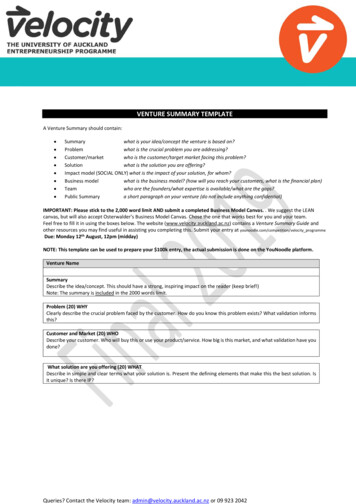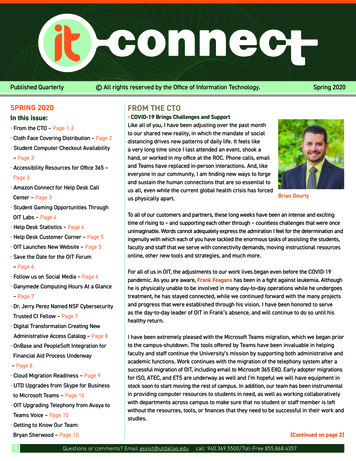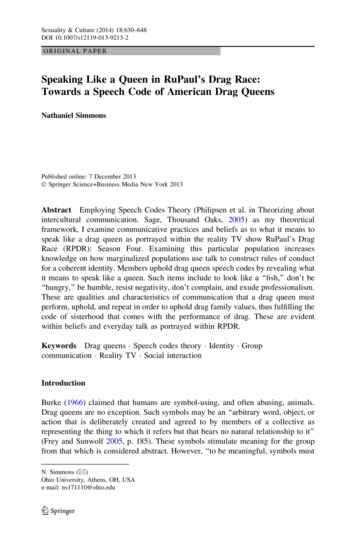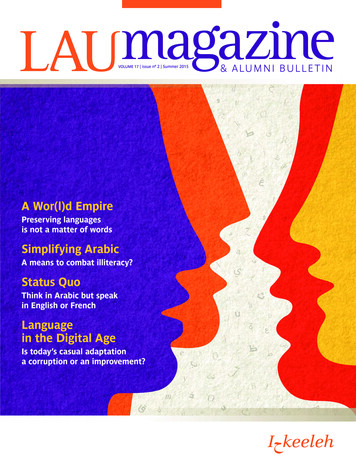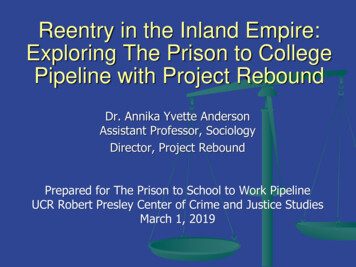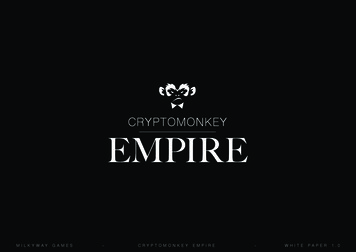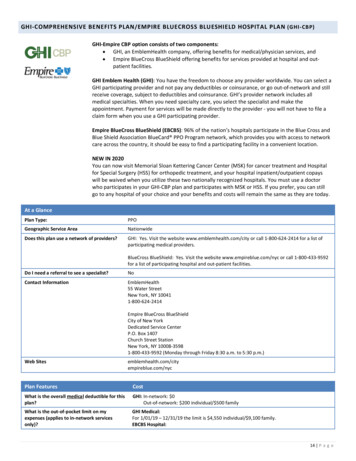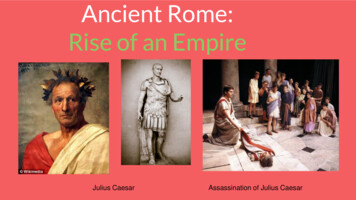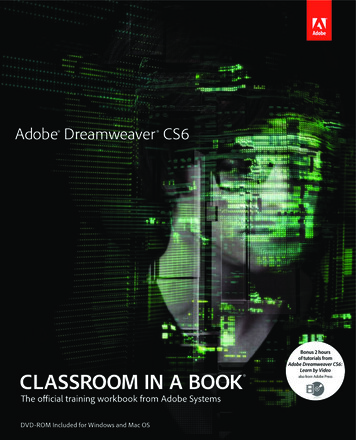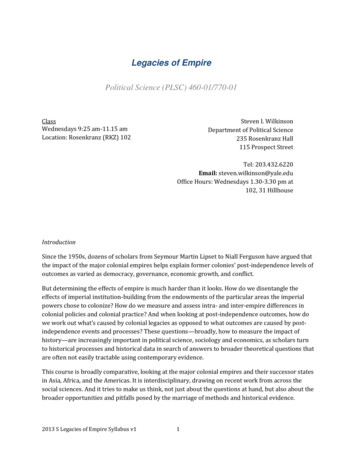
Transcription
Legacies of EmpirePolitical Science (PLSC) 460-01/770-01ClassWednesdays 9:25 am-11.15 amLocation: Rosenkranz (RKZ) 102Steven I. WilkinsonDepartment of Political Science235 Rosenkranz Hall115 Prospect StreetTel: 203.432.6220Email: steven.wilkinson@yale.eduOffice Hours: Wednesdays 1.30-3.30 pm at102, 31 HillhouseIntroductionSince the 1950s, dozens of scholars from Seymour Martin Lipset to Niall Ferguson have argued thatthe impact of the major colonial empires helps explain former colonies’ post-independence levels ofoutcomes as varied as democracy, governance, economic growth, and conflict.But determining the effects of empire is much harder than it looks. How do we disentangle theeffects of imperial institution-building from the endowments of the particular areas the imperialpowers chose to colonize? How do we measure and assess intra- and inter-empire differences incolonial policies and colonial practice? And when looking at post-independence outcomes, how dowe work out what’s caused by colonial legacies as opposed to what outcomes are caused by postindependence events and processes? These questions—broadly, how to measure the impact ofhistory—are increasingly important in political science, sociology and economics, as scholars turnto historical processes and historical data in search of answers to broader theoretical questions thatare often not easily tractable using contemporary evidence.This course is broadly comparative, looking at the major colonial empires and their successor statesin Asia, Africa, and the Americas. It is interdisciplinary, drawing on recent work from across thesocial sciences. And it tries to make us think, not just about the questions at hand, but also about thebroader opportunities and pitfalls posed by the marriage of methods and historical evidence.2013 S Legacies of Empire Syllabus v11
The course assumes some knowledge of the basic history of at least the British and French empires.Those students with no such background should be prepared to read and refer to a couple of goodgeneral histories, such as: Robert Aldrich, Greater France: History of French Overseas Expansion (St. Martin’sSeptember 1996). T.O. Lloyd, The British Empire, 1558-1995 (Oxford, 2nd edition 1997).You may also wish to read, for some brief background on the Japanese, Dutch, Spanish, Portugueseand Belgian empires, the following articles/extracts on J-Stor or the Classesv2 site: Angus Maddison, “Dutch Income in and from Indonesia, 1700-1938,” Modern Asian Studies,23, 4, (1989), pp.645-670. (J-Stor)John Lynch, “The Institutional Framework of Colonial Spanish America,” Journal of LatinAmerican Studies 24 (1992) pp.69-81. (J-Stor).Hyman Kublin, “The Evolution of Japanese Colonialism,” Comparative Studies in Society andHistory, Vol. 2, No. 1. (Oct., 1959), pp. 67-84. (J-Stor).D.K. Fieldhouse, The Colonial Empires: A Comparative Survey from the Eighteenth Century(NY: Delacorte Press) pp.325-371. [Brief summary of Dutch, Portuguese, Belgian, US andRussian empires].Bruce Cumings, The Legacy of Japanese Colonialism in Korea,” in Ramon H. Myers and MarkR. Peattie, eds. The Japanese Colonial Empire, 1895-1945 (Princeton, 1984) pp.479-96.There are three required books for the course. Two of these will be needed quite early on so youshould order them online as soon as possible. They are: Donald L. Horowitz, Ethnic Groups in Conflict (Berkeley, 2000).Jeffrey Herbst, States and Power in Africa: Comparative Lessons in Authority and Control(Princeton, 2000).James Mahoney, Colonialism and Postcolonial Development: Spanish America in ComparativePerspective (Cambridge, 2010).Other readings are either available online through Yale Library (almost all of the journal articles),through the URLs on the syllabus, or as an E-Reserve on Classesv2. Please let me know if a readingis not available.Paper50% of the grade is for a 15-20 page research paper, to be handed in by April 19th at 5pm. Latepapers will lose 1/3 of a letter grade for each day overdue (e.g. an A- grade paper will drop to a B ,a B paper will drop to a B-).MidtermAn in-class midterm exam on March 6th (two questions, no choice) will count for 25% of the overallgrade.2013 S Legacies of Empire Syllabus v12
Short Response papers15% of the grade is for 2 short 3-4 page response papers, on a topic to be assigned by me, onebefore and one after the midterm. Different people will be assigned to write these (with someinfluence over who does what according to preferences) this each week, after shopping.Class ParticipationThe quality of your classroom participation –in terms of regular attendance, having done thereadings and participation in the discussion--will count for 10% of your grade.This is a seminar where we are in conversation. Therefore I ask you not to take notes on a laptop, asworking with the computer distracts from engagement with the class conversation. I want toremind students that emailing, texting, etc. is rude to their fellow seminar participants, and will alsohave an adverse effect on their grade for class participation.Jan 16th2013Introduction—Democracy, Institutions and Conflict The effects of colonialism; different ways of assessing the effects; some leadingexplanations of the colonial impact; climate, the pre-colonial legacy and theissue of endogeneity; the issue of post-colonial policies. An overview of the course.Jan 23rd2013Democratic Legacies Seymour Martin Lipset, “Some Social Requisites of Democracy: EconomicDevelopment and Political Legitimacy,” The American Political Science Review,LIII, 1 (March 1959), pp.69-105. (J-Stor). Myron Weiner, “Empirical Democratic Theory and the Transition fromAuthoritarianism to Democracy,” PS, Vol. 20, No. 4. (Autumn, 1987), pp. 861866.(J-Stor). Samuel P. Huntington, “Will More Countries become Democratic?” PoliticalScience Quarterly, Vol. 99, No. 2. (Summer, 1984), pp. 193-218. Adam Przeworski, Michael Alvarez, José Antonio Cheibub and FernandoLimongi, “What Makes Democracies Endure? Journal of Democracy 7.1 (1996)39-55.http://muse.jhu.edu/journals/journal of democracy/v007/7.1przeworski.html Stanley L. and Kenneth L. Sokoloff. "The Evolution Of Suffrage Institutions InThe New World," Journal of Economic History, 2005, v65 (4,Dec), 891-921.When did empire end? Harry J. Benda, “Decolonization in Indonesia: The Problem of Continuity andChange,” The American Historical Review, 70,4 (1965), pp.1058-73. (J-Stor) Tony Smith, “A Comparative Study of French and British Decolonization,”Comparative Studies in Society and History 20, 1, (January 1978), pp.70-102. (JStor). Martin Staniland, “Francophone Africa: The enduring French Connection,”Annals of the American Academy of Political and Social Science, Vol. 489,International Affairs in Africa. (Jan., 1987), pp. 51-62. Garcia Ponce, Omar and Wantchekon, Leonard, Echoes of Colonial Repression:The Long-Term Effects of the 1947 Revolt upon Political Attitudes inJan 30th20132013 S Legacies of Empire Syllabus v13
Madagascar (2011). APSA 2011 Annual Meeting Paper. Available at SSRN:http://ssrn.com/abstract 1903315.Feb 6th2013States and Power Dan Slater, Ordering Power: Contentious Politics and Authoritarian Leviathans inSoutheast Asia (NY: Cambridge University Press, 2010), pp.50-114. Jeffrey Herbst, States and Power in Africa: Comparative Lessons in Authority andControl (Princeton, 2000). Carl Rosberg and Robert Jackson, “Why Africa’s Weak States Persist: TheEmpirical and Juridical in Statehood,” World Politics, Vol. 35, No. 1 (Oct., 1982),pp. 1-24.(J-Stor)Feb 13th2013Economic Legacies Leander Heldring and James Robinson, “Colonialism and EconomicDevelopment in Africa,” 2012 NBER Working Paper,http://www.nber.org/papers/w18566. Paul Bunnell, “The Colonial Legacy of Salary Structures in Colonial Africa,” TheJournal of Modern African Studies, 20, 1 (March 1982), 127-54. Atul Kohli, State-Directed Development: Political Power and Industrialization inthe Global Periphery (Cambridge, 2004) “The Colonial Origins of a ModernPolitical Economy,” pp.27-83 Edward Peter Fitzgerald, “Did France’s Colonial Empire make Economic Sense?A Perspective from the Postwar Decade,” The Journal of Economic History 48, 2(June 1988), pp.373-385. (J-Stor).Elliot J. Berg, “The Economic Basis of Political Choice in French West Africa,”American Political Science Review, 54, 2 (June 1960), pp.391-405. (J-Stor.)Feb 20th2013Ethnic Imbalances and Conflicts Horowitz Ch.4 “Group Comparison and the Sources of Conflict,” Ch.5 “GroupEntitlement and the Sources of Conflict,” pp.141-184, 185-228. David D. Laitin, “Hegemony and Religious Conflict: British Imperial Control andReligious Cleavages in Yorubaland,” in Rueschmeyer, and Skocpol, eds.Bringing the State Back In (Cambridge, 1985) pp.285-316. Daniel N. Posner, Institutions and Ethnic Politics in Africa (CambridgeUniversity Press, 2004), 21-88. Julian Wucherpfennig and Lars-Erik Cederman, “Who inherits the state?Colonial Rule and Post-Colonial Conflict,” APSA Conference paper 2012available at http://papers.ssrn.com/sol3/papers.cfm?abstract id 2107161Feb 27th2013Party Politics Horowitz, “Ch.10 “Multiethnic Alliances and Parties,” 396-440. Crawford Young, Politics in the Congo: Decolonization and Independence(Princeton, 1965) “The Rise of Nationalism: From Primary Resistance toPolitical Parties,” pp.273-317.2013 S Legacies of Empire Syllabus v14
Myron Weiner, “Institution-Building in India,” in Ashutosh Varshney/MyronWeiner, The Indian Paradox (Sage, 1989), pp.77-95. E-Reserves.Daniel N. Posner, “The Political Salience of Cultural Difference: Why Chewasand Tumbukas are allies in Zambia and adversaries in Malawi,” AmericanPolitical Science Review, 98,4, 529-45.In-Class MidtermMarch 6th2013Yale Spring Break March 8th-March 25th 2013.March 27th2013The Military Legacy Horowitz Ch.11 “The Militarization of Ethnic Conflict” and Ch.13 “The Effects ofIntervention and the Art of Prevention,” pp. 443-471, 526-59. Timothy H. Parsons, ‘Wakamba Warriors are Soldiers of the Queen’:TheEvolution of the Kamba as a Martial Race, 1890-1970, Ethnohistory 46, 4(Autumn 1999), pp.671-701.April 3rd2013‘Institutions’ Acemoglu, Daron, Simon Johnson and James A. Robinson (2001) “The ColonialOrigins of Comparative Development: An Empirical Investigation,” AmericanEconomic Review, 91, 5, 0.1257/aer.91.5.1369 and J-Stor). Przeworski, Adam. 2004. “Geography vs. Institutions Revisited: Were FortunesReversed?” Available zeworski/papers/reversal.pdf Pranab Bardhan, “History, Institutions and Underdevelopment,” in Bardhan,Scarcity, Conflicts and Cooperation: Essays in the Political and InstitutionalEconomics of Development (MIT Press, 2005), pp.1-26 [E-Reserves].Optional (Not optional for the graduate students ) April 10th2013Albouy, David (2012) “The Colonial Origins of Comparative Development: AnEmpirical Investigation: Comment,” The American Economic Review, 102(6):3059–3076 .6.3059.Acemoglu, Daron, Simon Johnson and James A. Robinson (2012) “The ColonialOrigins of Comparative Development: An Empirical Investigation: Reply,”American Economic Review, 102(6): 257/aer.102.6.3077Legal Institutions Fasseur C. (1992). “Colonial Dilemma: Van Vollenhoven and the Strugglebetween Adat Law and Western Law in Indonesia,” in W.J. Mommsen andJ.A. De Moor, eds. European Expansion and Law: The Encounter of Europeanand Indigenous Law in 19th and 20th-Century Africa and Asia (New York:2013 S Legacies of Empire Syllabus v15
Berg) pp.237-56. April 17th2013Douglass C. North, Understanding the Process of Economic Change(Princeton, 2005) Chapters. 8-10, pp.103-115, 127-145. (e-reserves).LaPorta, Rafael, Florencio Lopez-de-Silanes, & Andrei Shleifer, “TheEconomic Consequences of Legal Origins,” NBER Working Paper No. 13608,November 2007. www.nber.org/papers/w13608.Treisman, Dan (2000). “The Causes of Corruption: A Cross-National Study,”Journal of Public Economics 76, 3, 399-457.Mark Fathi Massoud, The Colonial Path to the Rule of Law in Sudan 18981956 (APSA Conference act id 1901110The Search for Identification Lakshmi Iyer, “Direct Versus Indirect Colonial Rule in India: Long-TermConsequences,” The Review of Economics and Statistics, November 2010, /pdfplus/10.1162/REST a 00023 Abhijit Banerjee and Lakshmi Iyer, History, Institutions and EconomicPerformance: The Legacy of Colonial Land Tenure Systems in India? AmericanEconomic Review, 95,4, (Sep 2005) 0.1257/0002828054825574. Nathan Nunn, “Religious Conversion in Colonial 57/aer.100.2.147. Lee, Alexander and Schultz, Kenneth A., Comparing British and FrenchColonial Legacies: A Discontinuity Analysis of Cameroon (2011). APSA2011 Annual Meeting Paper. Available at SSRN:http://ssrn.com/abstract 1903316LastSessionApril 24th2013Colonial Legacies in Latin America James Mahoney, Colonialism and Postcolonial Development: SpanishAmerica in Comparative Perspective (Cambridge, 2010).2013 S Legacies of Empire Syllabus v16
Horowitz Ch.11 “The Militarization of Ethnic Conflict” and Ch.13 “The Effects of Intervention and the Art of Prevention,” pp. 443-471, 526-59. Timothy H. Parsons, ‘Wakamba Warriors are Soldiers of the Queen’:The Evolution of the Kamba as a Martial Race, 1890-1970, Eth
